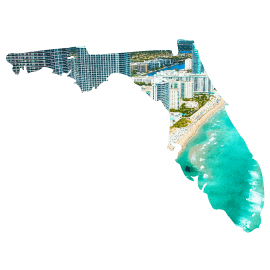Secondary Teacher Preparation in Social
Studies: Florida
Delivering Well Prepared Teachers Policy
Analysis of Florida's policies
Florida only offers secondary certification in general social science. Candidates must either earn at least a bachelor's degree with a major in social science, social studies, history, political science, geography, sociology, economics or psychology or at least a bachelor's degree with 30 semester hours in social science or social studies that include six semester hours in U.S. history, along with coursework in the following: Western civilization or European, Asian, African, Latin American or Middle Eastern history; economics; the U.S. government; geography; and sociology or psychology. Candidates must also pass the FTCE "Social Science" test. Teachers with this license are not limited to teaching general social studies but rather can teach any of the topical areas.
Middle school social studies teachers in Florida must earn at least a bachelor's degree with a major in social science, middle grades social science or middle grades social studies or a bachelor's degree with 18 semester hours in social science or social studies that include six semester hours in U.S. history, along with coursework in the following: Western civilization or European, Asian, African, Latin American or Middle Eastern history; economics; U.S. government; and geography. Candidates must also pass the FTCE "Middle Grades Social Science" test.
Florida has approved the repeal of its middle grades integrated curriculum certification, which will now ensure specific content certification rather than an integrated model.
Recommendations for Florida
Require secondary social studies teachers to pass tests of content knowledge for each social studies discipline they intend to teach.
States that allow general social studies certifications—and only require a general knowledge social studies exam—are not ensuring that these secondary teachers possess adequate subject-specific content knowledge. Florida's assessment combines all subject areas (e.g., history, geography, economics) and does not report separate scores for each subject area. Therefore, candidates could answer many history questions, for example, incorrectly, yet still be licensed to teach history to high school students.
State response to our analysis
Florida was helpful in providing NCTQ with the facts necessary for this analysis.
Select another topic
Delivering Well Prepared Teachers
- Admission into Preparation Programs
- Elementary Teacher Preparation
- Elementary Teacher Preparation in Reading Instruction
- Elementary Teacher Preparation in Mathematics
- Middle School Teacher Preparation
- Secondary Teacher Preparation
- Secondary Teacher Preparation in Science
- Secondary Teacher Preparation in Social Studies
- Special Education Teacher Preparation
- Assessing Professional Knowledge
- Student Teaching
- Teacher Preparation Program Accountability
Expanding the Pool of Teachers
Identifying Effective Teachers
- State Data Systems
- Evaluation of Effectiveness
- Frequency of Evaluations
- Tenure
- Licensure Advancement
- Equitable Distribution

